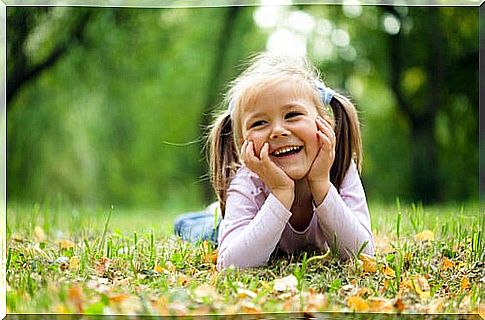The Benefits Of Nature For Children

The city, its streets, its buildings, its cars and its rhythm of life. We enter into its dynamics and let ourselves be carried away by it. It becomes part of ourselves, right? So much so that it seems that this rhythm of life is part of our essence, which is marked in our DNA.
But there comes a time when we can’t take it anymore and we need to disconnect, right? We fled. We go away. It can be to the town, to the beach, to the mountains … Wherever it is but we need to get out of the tangled concrete where we live. Is it that nature benefits us psychologically? And if so … What effects will it have on our little ones? Let’s find out!
The influence of the environment on us
Think that we are connected beings who are influenced by what they have around them. Circumstances and people around us have the power to impact us and are, at the same time, potential sources of influence for our behavior.

We are constantly analyzing the information that we have around us. Based on the conclusions we draw about what happens in our environment, we do, say, think and feel in different ways. In relation to this, environmental psychology arises, which has as its basic purposes, according to Günther (2009), the studies of the following:
- The impact of human behavior on the environment.
- The effect of the environment on people’s beliefs, feelings, and actions.
- The mechanisms to explain and induce changes in human behavior that promote the adoption of pro-environmental values and lifestyles, in line with the demands of environmental sustainability models.
Thus, numerous studies have been carried out on the relationship of people with their environment. Here we are going to collect the conclusions that they throw about the influence that natural and artificial environments have on children. Do you think that the studies will support the benefits that we assume that contact with nature treasures?
The consequences of living in urban environments.
Currently, a large part of the population lives in an urban environment. However, if we speak of ourselves as a species, another indissoluble truth appears: human beings have been in this type of habitat for “a short time”. On the other hand, urban environments bring a series of benefits such as improved economic productivity, facilitates the efficiency of services and rationalization of life.
It is obvious that cities make our lives more comfortable and easy. The problem is that they also create negative feelings in us, such as lack of control, dependence or depersonalization. Cities are full of situations that require our attention, which produces an information overload that can lead to stress.

This affects not only adults, but also children. In addition, it does it in a specific way. Often, children do not have time to play outdoors because the pace of life of people in the city and / or saturation with extracurricular activities. On the other hand, there are usually few safe and adequate spaces where they can socialize.
All this influences the development of the little ones and their health. In fact, there has been an increase in the occurrence of chronic health disorders in infants, especially in urbanized settings : obesity, asthma, attention deficit hyperactivity disorder, and vitamin D deficiency.
The benefits of contact with nature
The human being needs contact with nature. It has been proven that we tend to prefer natural places over artificial ones made by us. In fact, we benefit from spending time in such environments. It has been found that nature can contribute to recovering our psychological capacities after a task that requires intense or sustained mental effort for a long period of time.
It also helps us recover from stressful events and promotes more positive moods. And this in adults. Benefits of this contact with nature have also been found in the child population.

Studies indicate that the more nature near the place of residence, the greater the ability of children to control impulses, concentrate and delay gratification. In terms of leisure time, it has been found that children play more, with a greater number of children, more creatively and even share more quality time with adults.
In addition, contact with nature can cushion the negative effect of stress on children. It has also been found that the presence of natural environments in the residential area favors their self-esteem and reduces psychological discomfort. Likewise, they express more positive feelings. These results are also observed if there are more green spaces in the schoolyard and its surroundings.
Based on these psychological, social and affective benefits, it is interesting to take this into account to improve the development of our little ones. The point is not that we have to stop living in cities, but rather that we enjoy the natural spaces that we find in them and encourage their use from an early age.
Images courtesy of Ryan McGuire.









